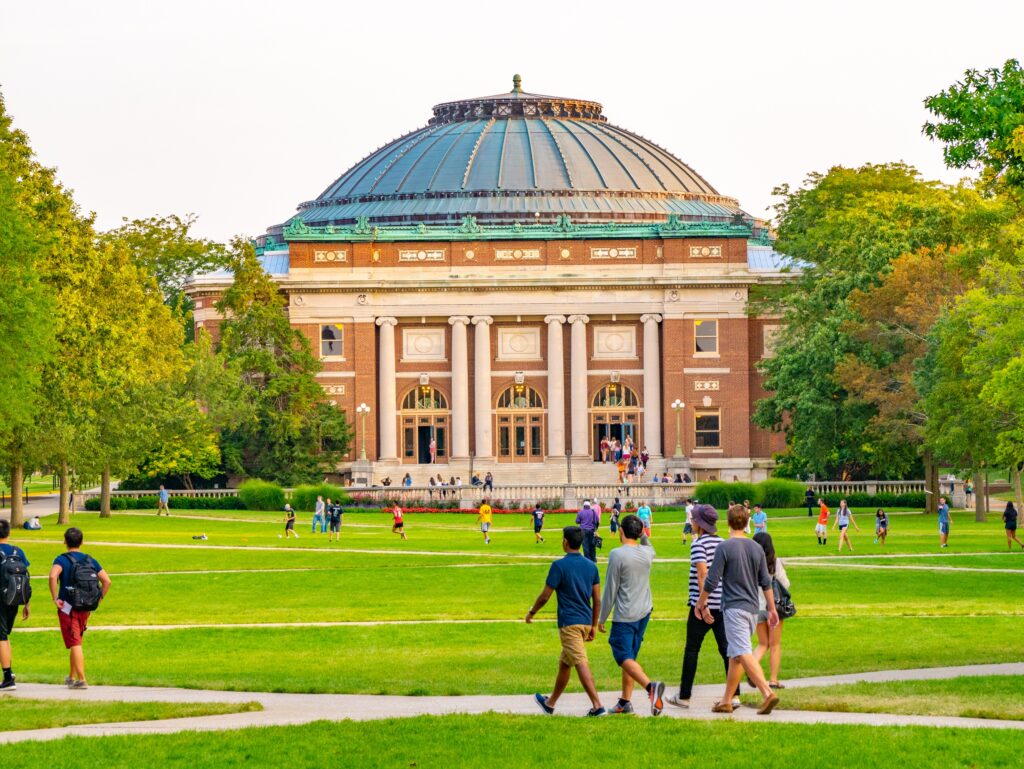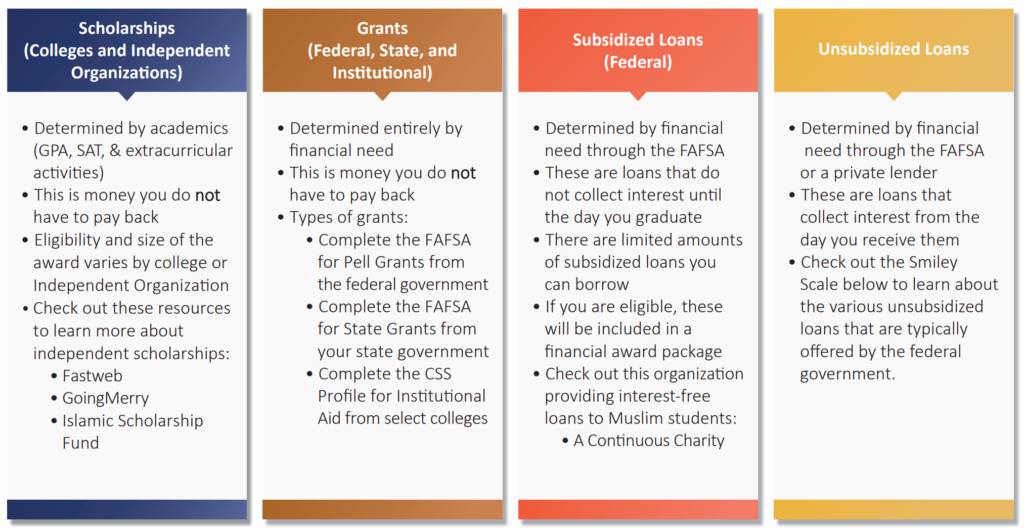Moving from Youth to Adulthood
By Lisa Kahler
May/June 2023

How do you choose the right college and pay for it? Many Muslim families face these and similar dilemmas every year.
In a recent webinar entitled “Choosing the Right College,” The Islamic Schools League of America (ISLA) tried to provide insight via panelists representing different viewpoints on higher education: Habeeb Quadri (superintendent, MCC), Dr. Nisa Muhammad (chaplain, Howard University), Salman Khan (founder, Muslim Campus Life & Hidayah Services) and Abdullah Syed (executive director, A Continuous Charity).
This choice will have lifelong consequences and affect the entire Muslim community because relationships, debt, income, career choice and family life interconnect us all. The speakers stated the importance of choosing a college that fits into a family’s budget while providing their teenager(s) with the spiritual, emotional and academic support during his/her crucial formative years as a young adult. One of them noted that “the number one school may not be the number one school for you.”
In an interview after the webinar, Salman Khan stated, “As a community we need to recognize that the college experience is transformational, not transactional. We have to ensure that Muslim students have access to the resources that will make this transformation a positive experience personally, professionally and spiritually.”
The speakers expanded upon Quadri’s “7 Tips to Choose a College.” While all points are valid, they emphasized that students must rank the items in order of importance for their own lives:
- faith (campus life, Muslim support groups, nearness to a mosque, etc.)
- academics (alignment with interests and career goals)
- family (nearness to family and relatives)
- social & emotional
- well-being (on-campus support services)
- budget (family and student finances)
- campus culture (organizations, clubs and other students who look like you)
- career support (internships, mentors, networking and job opportunities)
- Muslim chaplain (provides student support, organized activities and connection with school administration) and
- food options (halal).
Based on his experience, Quardri counsels students and families to focus on their top five and then create a checklist. For each point, students should note questions or items of importance.
For example:
- Do I want to pray at a mosque, an on-campus Muslim chapel, an on-campus designated room or in my room?
- Are my key interests represented?
- What is my religious and/or ethnic identity?
- Who am I?
- These key points indicate if a student fits in and can envision staying there for four years. People on campus who look like me is perhaps one of the most important criteria in choosing a college.
Who Am I?
Dr. Nisa Muhammad noted that students must be honest and self-reflective, as well as spend time listing goals and aspirations, during the application process. She advises them to “find their mission” in life, choose the appropriate major and mentor to ensure long-term personal growth and help them achieve their mission and, when visiting the college, ask about the availability of appropriate mentors.
During this journey, parents need to be supportive and have honest conversations with their child(ren) on their likes/dislikes. A respected third party, such as a particular relative or teacher, may be included to provide thoughtful feedback on the student’s strengths and weaknesses. The support of family and friends for a young person transitioning to adulthood is critical as well, for many students find it hard to live on their own in a distant city. Being close to a family support network is important for many of them, as is the need to develop one’s strength and resilience by experiencing personal independence and the real world.
Abdullah Syed shared his own college backstory. Dreaming of becoming an astronaut, he attended the far away, well-regarded, and expensive Purdue University. While the school community was very supportive, he didn’t do well and returned home after two years with a high student debt. He transferred to a local community college, changed his major, regained his focus and improved his grades. Syed noted that only 27% of college graduates end up in their original field of study. It’s more important for students to hold on to the ultimate “vision” for their future than any specific degree or major.
Finances
Salman Khan advises students and their parents, “In terms of financing college, read the Muslim College Guide’s ‘Financial Fit’ (Muslim Campus Life) section and understand your financial options before you even apply to a college.” Parents must review their financial situation carefully and be realistic as to how much financial support they can provide their student(s) annually without endangering the family’s financial stability.
College-related costs include not only tuition and fees, but also books, travel, food, snacks, household supplies and transportation. While many sources of financial aid are available, a student may still have to take out a student loan. “The Muslim College Guide” suggests not borrowing more than $7,000/year, unless it’s very likely that the student will secure a high-paying job upon graduation — a possibility for certain high-demand majors.
Student loans are not only hard to pay back, but also involve interest — a concern for many Muslims. Currently, about $1.635 trillion in total student loans is owed by 43.5 million borrowers in the U.S., with an average of $31,410 borrowed by a public university student to receive a bachelor’s degree (Education Data, Student Loan Statistics).
Here is a brief description of the types of financial aid available (adapted from the 2021-22 “The Muslim College Guide”): USE THE CHART HERE INSTEAD OF THIS
The nonprofit A Continuous Charity (ACC) provides interest-free loans to select Muslim students every year. As these are paid back over time, new loans are provided to incoming college students. Currently, student need far exceeds the nonprofit’s resources. In the previous application cycle, only 89 of the 250 applicants received loans.
Applicants are encouraged to apply early, and note the following key points:
• Merit (academic, social, religious or other). Note accomplishments.
• Financial Need. Loans depend solely upon the student’s financial situation, as they are meant to fill the gap between his/her and family resources, scholarships and the college’s financial assistance.
• Community Service. Preference for students who are giving back to their community (Muslim community service not required).
• Islamic Education. Students studying Islam, Arabic and the Quran are given preference, as they will need interest-free loans.
• Location. Students involved in active Muslim communities will help make fundraising for a community charity easier. While this charity is expanding, lending focuses on those regions with high Muslim populations. However, loans are provided to students nationwide.
Testing
More colleges are now “test-optional,” meaning that it isn’t always necessary to submit the scores of college placement exams. Although such assessments are just one piece of the pie, if they aren’t submitted then the other pieces become more important.
Deadlines
Application deadlines vary, and scholarship deadlines vary depending on the provider. The FAFSA application (https://studentaid.gov/h/apply-for-aid/fafsa) opens on October 1 for the following school year.
With many decisions to make as students and families begin to think about college, it’s always a good reminder to make dua and pray istikhara for divine guidance. We look forward to our youth transiting from a student to a community leader without debt and in a good mental and emotional state. As a final comment, Khan advises parents to “stay engaged with your child[ren] as they navigate the college process. Learn with them, guide them and don’t allow yourself to sit in the backseat or the driver’s seat. Stay in the passenger seat.”
To learn more, consult the following sites:
• Interest-Free Student Loans for Muslims
• A Continuous Charity: A Continuous Charity

Lisa Kahler is educational program manager, MuslimKidsTV.
Tell us what you thought by joining our Facebook community. You can also send comments and story pitches to horizons@isna.net. Islamic Horizons does not publish unsolicited material.
